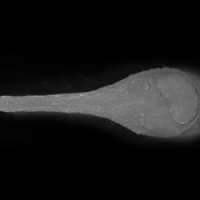Credit: University of Western Australia
Male mice exposed to other male competitors have thicker penis bones according to a new study by researchers at The University of Western Australia, published today in Proceedings of the Royal Society B: Biological Sciences.
Ph.D. candidate and lead researcher Gonҫalo Igreja André, from UWA's School of Biological Sciences, said it was the first time a study had shown that the social environment in which males grow up could have an impact on their genital shape.
"We've only ever seen this kind of result before in ducks but this is the first study to show that the shape of a mammal's genitals can vary according to the social environment in which the males mature," Mr Igreja André said.
"Sexual competition has been shown to influence sexual responses that are important for the reproductive success of house mice and other mammals.
"For example, males exposed to the presence of rivals produce more sperm and our study revealed that the penis bone or baculum of mice develops differently when males perceive there is a risk of sexual competition.
"Our research findings support the idea that penis shape and not size is under sexual selection and begs the question how this structure influences a male's ability to father offspring when females mate with several males."
Mr Igreja André said the next step was to work out the mechanism by which the penis bone influenced sexual reproduction.
More information: Gonçalo I. André et al. Phenotypic plasticity in genitalia: baculum shape responds to sperm competition risk in house mice, Proceedings of the Royal Society B: Biological Sciences (2018). DOI: 10.1098/rspb.2018.1086
Journal information: Proceedings of the Royal Society B
Provided by University of Western Australia























